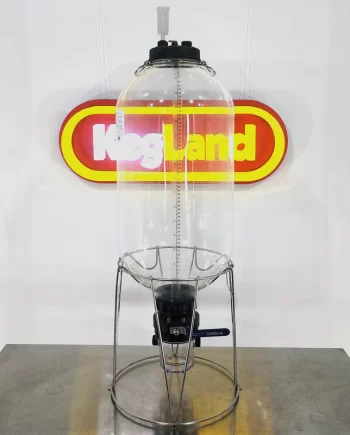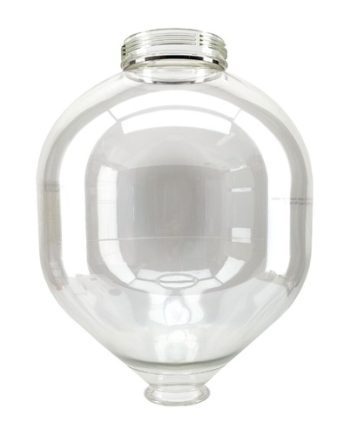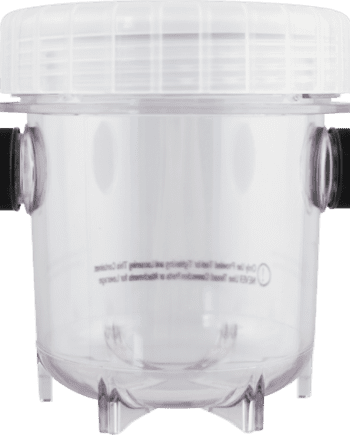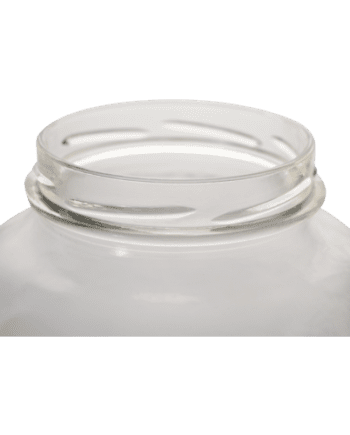Description
The ultimate plastic pressurized conical
- A best seller for a reason! Tons of features at an incredible price
- Cyrstal clear super smooth PET makes fermenting and cleaning super easy
- 3″ Butterfly valve at bottom makes removing yeast / trub easy with the 600mL collection jar
- Pressurizable (with accessories) for fermentation and closed transfer to your keg
The Gen 3.2 FermZilla Tri-Conical features a newly designed collection container with top & bottom PCO1881 ports. The collection container has a 3″ T.C. opening and installs on the Conical with a 3″ T.C. butterfly valve. The molded 3″ T.C. ferrule on the tank is a huge improvement over the Gen 2 model—eliminating the complicated dump valve design and simplifying the collection container connection. Brew with confidence on the new Tri-Clover FermZilla!
NOTE: The primary example photo shows the collection container from the Gen 3 FermZilla.
Out of the box, the FermZilla Conical is an amazing fermenter that will immediately step up your game on the cold side of the brewing process. But what we love most about this unit is how easily it is to upgrade as you go—adding more functionality and gaining more precise control over your fermentation with each new accessory. Below are some of our favorite add-ons for the FermZilla Tri-Conical Fermenter.
Pressure Kit
The FermZilla is the perfect option for brewers that want all the advantages of a conical fermenter without the price tag of a full blown stainless steel unit. It allows you to dump trub, harvest yeast, and with the addition of the FermZilla Pressure Kit, you can carbonate and serve – all in one vessel! The clear PET tank allows you to visually monitor fermentation activity and is pressure rated to 2.4 Bar (34.8 psi), which means you can ferment under pressure, reducing ester and fusel alcohols in your finished beer. This also gives the ability to perform pressure transfers. If you prefer to move your finished beer to a keg or other vessel, you can do so with little to no oxygen exposure.
Tri-Clamp Pressure Lid
Add a 2″ T.C. port to your fermenter by replacing the standard lid with the FermZilla Tri-Clamp Pressure Lid. This will give you an opening to add dry hops or other additions without needing to remove the entire lid, or you can upgrade down the road with a Hop Bong sight glass in order to add CO2 and purge your hop charge of oxygen. PCO1881 threaded ports are still there for Ball Lock Caps, as well as undrilled ports for an optional Thermowell and Temp Twister cooling coil.
Hop Bong Pressure Pack
The ultimate upgrade kit! The Hop Bong Pressure Pack has all of the parts included with the Pressure Kit and Tri-Clamp Pressure Lid but fully parted out to remove the guess work. If the Tri-Conical is your first FermZilla fermenter, this accessory kit is for you. Load up the Hop Bong, flush it with CO2, purge out oxygen with the handy PRV on top, then simply open the Butterfly Valve to inject your beer with a 6 oz payload of dry hops.
FermZilla Gen 3 vs Gen 3.2:
- 3″ x 3″ T.C. butterfly dump valve
- 3″ T.C. compatible collection container
- 600 mL collection container w/ top & bottom PCO1881 threaded ports
What’s Included:
- FermZilla 27L Tank with 3″ T.C. Bottom Port
- 3″ T.C. Butterfly Valve
- 600 mL Collection Container with 3″ T.C. Connection
- Stainless Steel Stand with Swing Handles
- Stainless Steel Handle Assembly
- Top Lid with PRV (35 psi)
- 3″ tri-clamp with gaskets
- 3-Piece Airlock
- Graduation Sticker
- Adhesive Thermometer
- Spare Seals
Specs:
- 27 L (7.1 gal) Total Volume
- Pressure Rated to 2.4 Bar (34.8 psi)
- Height in Stand – 29.5″
- Height w/ Airlock – 33.7″
- Tank Diameter – 13.9″
- Diameter in Stand – 15.3″
- Lid & Collection Container Ports – 28 mm PCO 1881 threads
- Temperature Rating:
- When not under pressure, do not expose to liquids above 131°F
- When under pressure, do not expose to any temperatures above 95°F*
*Please note that the temperature rating for the FermZilla tank is lower when using it under pressure. When not under pressure, it is perfectly safe to transfer wort into the tank below 131°F or to use hot liquids below this temp for cleaning. When under pressure, make sure to keep your fermentation temperature below 95°F and keep the fermenter in an environment that is below 95°F ambient. This is especially important when fermenting with kveik yeast. These strains are known to ferment hot if no temperature control is being used. Exceeding the temperature rating may compromise the tank, leading to a shorter life span or sudden failure to maintain pressure. Even with proper use, we recommend replacing the tank every two years.
Please note: when using the FermZilla under pressure, you must perform a water pressure check to ensure your connections are leak proof. To do this, fill your FermZilla up with water, apply at least 15 psi pressure, and check for leaks around all caps and threads.
Pressure Stress
If you use the FermZilla to ferment under pressure, or you use CO2 to pressure transfer or force carbonate your finished beer, it is very important that you conduct semi-annual inspections of your tank. Even with perfect care, the FermZilla tank may show signs of wear from pressure stress over time. We recommend visually inspecting your tank for stress creases or other signs of wear once or twice a year. A hydro test should be conducted every two years, even if no signs of wear are found. The process is simple:
- Fill the tank to the brim with water
- Replace the Red PRV with a Green PRV rated to 4.5 BAR or higher
- Pressurize the tank to 4 BAR (58 psi)
- Check for leaks, then replace the Red PRV when finished
If leaks or potential points of failure are found, replace the tank before you continue using pressure with your FermZilla.
Taking good care of your FermZilla begins with cleaning and sanitizing the unit before and after use. The tank is made from food-grade PET, which is beautifully clear, but can be sensitive to long soaks in cleaners and acid-based sanitizers. In general, we do not recommend leaving products like PBW or StarSan soaking in the tank for more than an hour. Extended soaks have the potential to degrade the PET material and shorten the lifespan of the tank.







